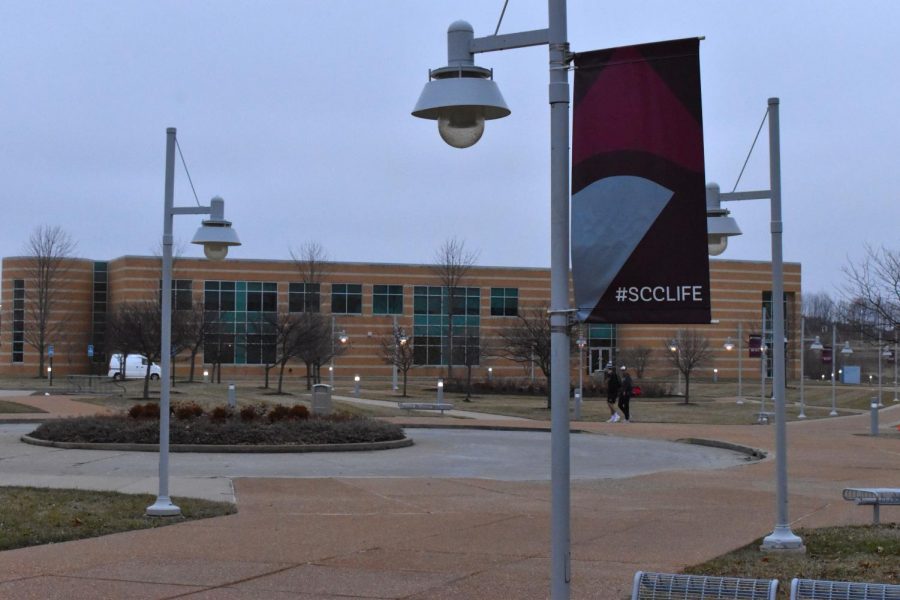FHSD Starts New Early College Program Through SCC
Credit to Courtney Wortman
Students walk around the campus of St. Charles Community College (SCC), making their way to their classes for the day. SCC is a two year public community college which allows students to attend for $3,768 a year. The school offers associate degrees in the arts, business, sciences and career-technical fields as well as workforce training and community-based personal and professional development.
Published: February 20, 2020
The Francis Howell School District will be expanding an “early college” program in the 2020-21 school year, allowing students to earn credits that work towards both a college education and a high school diploma. The program had a “soft roll-out” this year.
“The goal here was to make it more available and more widely known to more students and in higher numbers of courses,” Nathan Hoven, deputy superintendent and Chief Academic Officer for FHSD said. “The state had moved forward a few years back with a guarantee that certain courses through the community college are going to transfer to Missouri’s other public colleges.”
Because the program is run through St. Charles Community Colllege, students must meet certain SCC as well as district set requirements to enroll including a grade, GPA, coursework, attendance and a good citizenship requirement. Students must also maintain at least C grades in their SCC classes or risk removal from the program.
“Once they start a semester they’ve committed to that semester at a minimum,” Lucas Lammers, Director of Secondary Education for FHSD and the person credited with laying most of the groundwork for the program said. “This is what you do when you’re really a college student. It’s really your responsibility to be talking to professors and counselors there. This is an opportunity for students to learn that.”
FHSD’s vision for the program is composed of three “lanes”, each with their own advantages. Lane one allows students to complete their general education requirements, and it ranges from 42-48 credit hours. Lane two allows students to earn a full associate’s degree. Students would take their entire schedule at SCC. Finally, lane three is the “à la carte” model allowing students to mix classes at FHN and SCC.
“The most attractive option is trying to get Gen Ed out of the way,” Lammers said. “When you get through two years, you can go straight into courses that line up with your major. I think lane one or lane two is the greatest opportunity considering it’s only $50 per credit hour.”
It should be noted, however, that not all classes at SCC are required to graduate and that students will need to coordinate with both SCC and FHN’s counselors to pick classes that count towards fulfilling the educational requirements of both schools. These courses are listed in the program’s catalog.
“We would strongly recommend some [courses],” FHN head principal Nathan Hostetler said. “If you want to go learn to weave baskets, go do you, but that may not help you graduate from high school.”
While the district expects to see a small dip in enrollment in AP classes, they don’t want students to consider the “early college program” a replacement, only another option. The district has made sure the program is compatible with other district programs like CAPs, Lewis and Clark and the work program.
“There’s very much flexibility,” Hoven said. “We purposefully made it available that if a student can schedule their time at the community college with that in mind, and so we absolutely expect to see students who spent part of the day at the college and then continue with the other commitments they’ve made.”
FHSD hopes that by allowing students to take more of their education into their own hands, they’ll be more focused on their futures and on their studies. Essentially, the “when are we ever going to use this?” crowd.
“There’s this myth of an unmotivated student, it’s bogus,” Hostetler said. “Everybody’s motivated to do something. What people really mean is ‘they’re not motivated towards the things I wish they were’. One of the things we could do to help students move forward is to give them a glimpse of their future, a way to move towards their future.”
Any implementation of the early college program will not be impacted by the success or failure of the bonds issue being placed on the April ballot.








![Varsity Boys Volleyball Fall Short Against FHC [Photo Gallery]](https://FHNtoday.com/wp-content/uploads/2025/03/IMG_0453-300x200.jpg)

![Girls Varsity Soccer Falls to Liberty High School [Photo Gallery]](https://FHNtoday.com/wp-content/uploads/2025/04/03.27_GirlsSoccer_JDelapaz-15-300x200.jpg)
![Francis Howell Boys Lacrosse Win Against O'Fallon [Photo Gallery]](https://FHNtoday.com/wp-content/uploads/2025/04/RMurrell_VBoysLacrosse_4.12.25-2-1200x800.jpg)
![JV Boys Baseball Mercy Rule Pattonville Pirates [Photo Gallery]](https://FHNtoday.com/wp-content/uploads/2025/04/JVBaseballVs.PattonvilleTaylorGriffin4_14-27-1200x800.jpg)
![Boys Varsity Baseball Takes A Win Against Orchard Farms [Photo Gallery]](https://FHNtoday.com/wp-content/uploads/2025/04/VarsityBaseball_TaylorGriffin4_11VS.OrchardFarm-42-1200x800.jpg)